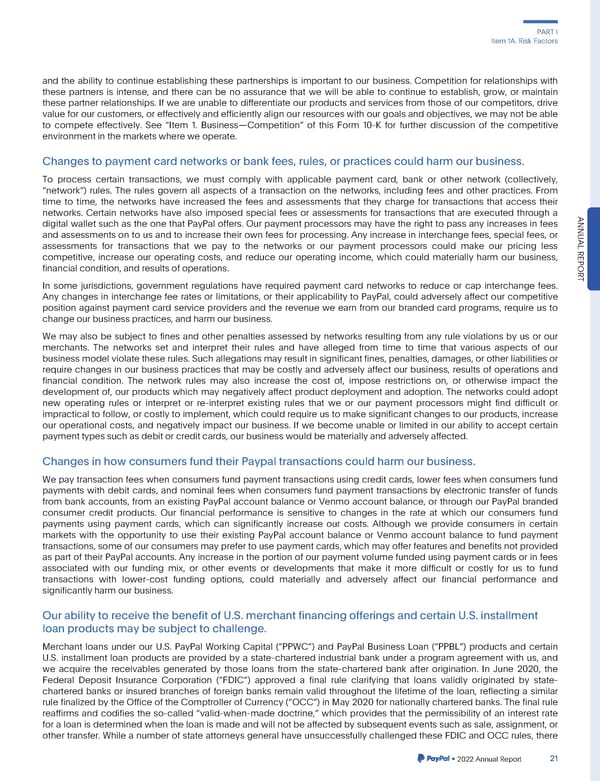PARTI Item1A.RiskFactors and the ability to continue establishing these partnerships is important to our business. Competition for relationships with these partners is intense, and there can be no assurance that we will be able to continue to establish, grow, or maintain these partner relationships. If we are unable to differentiate our products and services from those of our competitors, drive value for our customers, or effectively and efficiently align our resources with our goals and objectives, we may not be able to compete effectively. See “Item 1. Business—Competition” of this Form 10-K for further discussion of the competitive environmentinthemarketswhereweoperate. Changestopaymentcardnetworksorbankfees,rules,orpracticescouldharmourbusiness. To process certain transactions, we must comply with applicable payment card, bank or other network (collectively, “network”) rules. The rules govern all aspects of a transaction on the networks, including fees and other practices. From time to time, the networks have increased the fees and assessments that they charge for transactions that access their networks. Certain networks have also imposed special fees or assessments for transactions that are executed through a digital wallet such as the one that PayPal offers. Our payment processors may have the right to pass any increases in fees ANNU andassessmentsontousandtoincreasetheirownfeesforprocessing.Anyincreasein interchangefees, specialfees, or assessments for transactions that we pay to the networks or our payment processors could make our pricing less AL competitive, increase our operating costs, and reduce our operating income, which could materially harm our business, REPOR financial condition, and results of operations. In some jurisdictions, government regulations have required payment card networks to reduce or cap interchange fees. T Any changes in interchange fee rates or limitations, or their applicability to PayPal, could adversely affect our competitive position against payment card service providers and the revenue we earn from our branded card programs, require us to changeourbusinesspractices,andharmourbusiness. Wemayalsobesubject to fines and other penalties assessed by networks resulting from any rule violations by us or our merchants. The networks set and interpret their rules and have alleged from time to time that various aspects of our businessmodelviolatetheserules.Suchallegationsmayresultinsignificantfines,penalties,damages,or otherliabilitiesor require changes in our business practices that may be costly and adversely affect our business, results of operations and financial condition. The network rules may also increase the cost of, impose restrictions on, or otherwise impact the development of, our products which may negatively affect product deployment and adoption. The networks could adopt new operating rules or interpret or re-interpret existing rules that we or our payment processors might find difficult or impractical to follow, or costly to implement, which could require us to make significant changes to our products, increase our operational costs, and negatively impact our business. If we become unable or limited in our ability to accept certain paymenttypessuchasdebitorcreditcards,ourbusinesswouldbemateriallyandadverselyaffected. ChangesinhowconsumersfundtheirPaypaltransactionscouldharmourbusiness. Wepaytransactionfees when consumersfund payment transactionsusing credit cards, lower fees when consumers fund payments with debit cards, and nominal fees when consumers fund payment transactions by electronic transfer of funds from bank accounts, from an existing PayPal account balance or Venmo account balance, or through our PayPal branded consumer credit products. Our financial performance is sensitive to changes in the rate at which our consumers fund payments using payment cards, which can significantly increase our costs. Although we provide consumers in certain markets with the opportunity to use their existing PayPal account balance or Venmo account balance to fund payment transactions, some of our consumers may prefer to use payment cards, which may offer features and benefits not provided as part of their PayPal accounts. Any increase in the portion of our payment volume funded using payment cards or in fees associated with our funding mix, or other events or developments that make it more difficult or costly for us to fund transactions with lower-cost funding options, could materially and adversely affect our financial performance and significantly harm our business. Ourability to receive the benefit of U.S. merchant financingofferings and certain U.S. installment loanproductsmaybesubjecttochallenge. Merchant loans under our U.S. PayPal Working Capital (“PPWC”) and PayPal Business Loan (“PPBL”) products and certain U.S. installment loan products are provided by a state-chartered industrial bank under a program agreement with us, and we acquire the receivables generated by those loans from the state-chartered bank after origination. In June 2020, the Federal Deposit Insurance Corporation (“FDIC”) approved a final rule clarifying that loans validly originated by state- chartered banks or insured branches of foreign banks remain valid throughout the lifetime of the loan, reflecting a similar rule finalized by the Office of the Comptroller of Currency (“OCC”) in May 2020 for nationally chartered banks. The final rule reaffirms and codifies the so-called “valid-when-made doctrine,” which provides that the permissibility of an interest rate for a loan is determined when the loan is made and will not be affected by subsequent events such as sale, assignment, or other transfer. While a number of state attorneys general have unsuccessfully challenged these FDIC and OCC rules, there •2022AnnualReport 21
 2023 Annual Report Page 168 Page 170
2023 Annual Report Page 168 Page 170